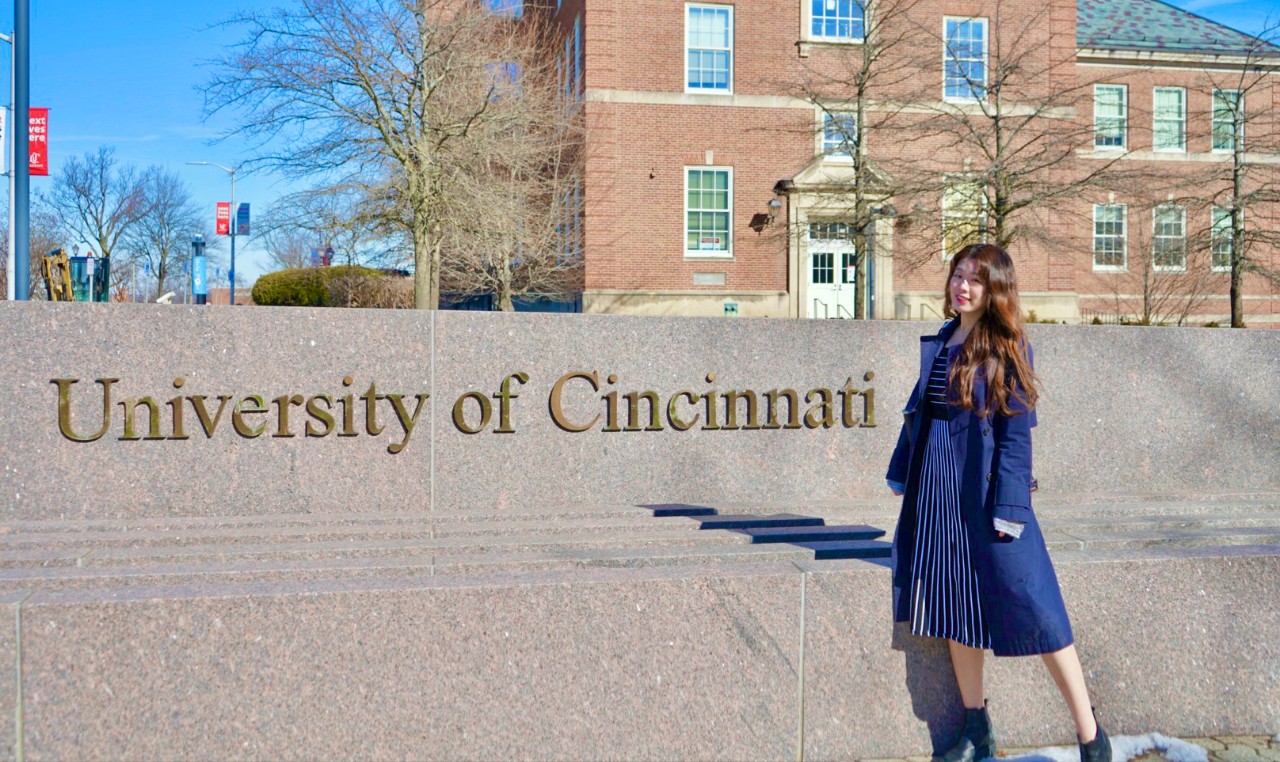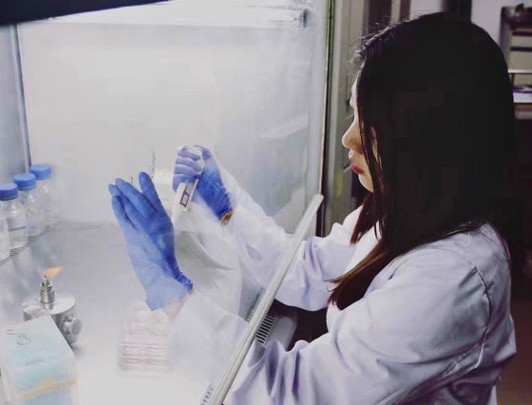
Pharmacy grad with novel idea in melanoma therapy earns PhD in record time
Strong research environment and mentoring lead to a UC pharmacy PhD in just over three years
Although navigating the rigorous current of doctoral research studies is often stressful and can spawn a very long journey, Tianyi Liu, recent grad in the University of Cincinnati’s James L. Winkle College of Pharmacy, accomplished her goals in record time.
While taking advantage of UC’s strong resources and innovative research environment, Liu not only made a breakthrough in her cancer research but defended her dissertation and earned her PhD in pharmaceutical sciences — all in just three and a half years.
It was during Liu's undergrad studies in pharmacy at the Harbin Medical University in Harbin, China, where she developed her early passion for pharmaceutical and cancer research. Working in both cancer and stem cell biology laboratories, Liu learned to develop research ideas and organize and analyze experimental data.
Pursuing a master’s degree to further expand her research skills and knowledge base quickly became Liu’s top priority.
When her application to UC’s master’s program in pharmaceutical science was reviewed, however, Yuhang Zhang, UC associate professor of pharmacy, quickly found Liu’s enthusiasm for pharmaceutical studies so compelling he encouraged her to go beyond striving for a master’s degree and instead enter UC’s doctoral program in experimental therapeutics — in particular, exploring the tumor microenvironment in melanoma.
Liu's academic excellence and innovative research goals strongly align with UC's Next Lives Here strategic direction.
“I am very proud of discovering Tianyi from a pool of highly competitive applicants,” says Zhang. “Tianyi is a young and promising scientist by training with clear professional goals and great potential to develop a research career in biomedical science.”

Liu enjoyed UC's diverse and innovative research environment and looks forward to working in the biotechnology industry after graduating with a PhD from UC's James L. Winkle College of Pharmacy. photo/provided
Immediately, Liu began searching for clues — clues for why some folks are resistant to novel drug therapies designed to cure melanoma skin cancer.
“Novel therapies developed in recent years have been successful in treating malignant melanoma, a rapidly growing skin cancer,” says Liu. “But a significant percentage of patients develop resistance to these drugs within the first several months of the treatments.”
Under Zhang’s mentorship, Liu began looking closer at molecular clues for unique changes happening in a specific cell type referred to as the cancer-associated fibroblast — a very active and abundant stromal cell type associated with poor prognosis in many types of cancer.

While making new discoveries in cancer-associated fibroblast research, Liu hopes her findings lead to further studies that result in improved patient outcomes. photo/provided
While stromal cells are typically genetically stable, Liu says they can eventually contribute to cancer growth. To see the changes that induce drug resistance, Liu used melanoma tissues collected from patients before and after undergoing drug treatment to track the role of certain genes during the therapeutic treatment.
“Surprisingly, we found this specific fibroblast becoming more active in some of the patients,” says Liu. “The very gene therapy designed to kill cancer cells unexpectedly makes those fibroblasts in the tumor stroma become more active, abundant and tumor-promoting.
“We hope these findings provide a new pathway to boost the efficacy of current targeted therapy and immunotherapy, as well as improve patient outcomes.”
Throughout her three and a half years as a doctoral student, Liu’s accomplishments include two presentations at international medical conferences and receiving the James L. Winkle College of Pharmacy Peer Academic award, the Rieveschl/Parke-Davis Doctoral Candidacy award and later a Rieveschl/Parke-Davis fellowship.
With 11 journal publications already under her belt, Liu hopes to publish her dissertation research on cancer-associated fibroblasts in a major peer-reviewed cancer journal later this year.
Family genes

Liu and her mother, a neurologist in China, have been strong role models for each other as her mother also works toward earning her own PhD. photo/provided
The proverbial scientific apple didn’t fall far from Liu’s family tree, as her own mother is currently a neurologist in China and is now pursuing a doctoral degree in neuroscience at Hebei University in China.
“Watching my mother work so hard for her patients in the hospital while studying very hard for her PhD really inspired me to go into the sciences,” claims Liu. “It’s so nice to share a similar career goal with your mom — we are both very proud of each other.”
After defending her dissertation and earning her PhD in pharmaceutical sciences in February, Liu accepted an offer from the prestigious University of California San Francisco as a postdoc fellow in their cancer biology lab to study the immune tumor microenvironment.
“It was through the incredible mentorship of Professor Zhang and the unique opportunities at UC and their collaborative relationships with Cincinnati Children’s Hospital that enabled me to grow and develop my passion for pharmaceutical research even further,” says Liu. “Because of these successful experiences I look forward to eventually working in the biotechnology industry in the San Francisco Bay area — it’s such a hotbed for biotech companies: Genentech, Amgen, Gilead, AbbVie — you name it.”
- Learn more about UC’s James L. Winkle College of Pharmacy academic programs
Featured image at top: Tianyi Liu, recent doctoral grad from UC's James L. Winkle College of Pharmacy, on the bridge in the College of Medicine atrium. Photo/provided
Impact Lives Here
The University of Cincinnati is leading public urban universities into a new era of innovation and impact. Our faculty, staff and students are saving lives, changing outcomes and bending the future in our city's direction. Next Lives Here.
Related Stories
Leaders, scholars, changemakers: CoM students earn prestigious...
May 13, 2025
The University of Cincinnati's College of Medicine is proud to celebrate the outstanding achievements of three remarkable students, who have been recognized with two of the university’s highest honors.
Study links adverse childhood experiences to higher risk of...
May 12, 2025
Children who have been exposed to adverse childhood experiences face an increased risk of homelessness during their childhood, according to a new study from a researcher in the University of Cincinnati’s School of Social Work.
$2 million gift establishes John and Carrie Hayden Community...
May 12, 2025
Kitchen expands whole-person, integrative approach of the Osher Center, University of Cincinnati Cancer Center
